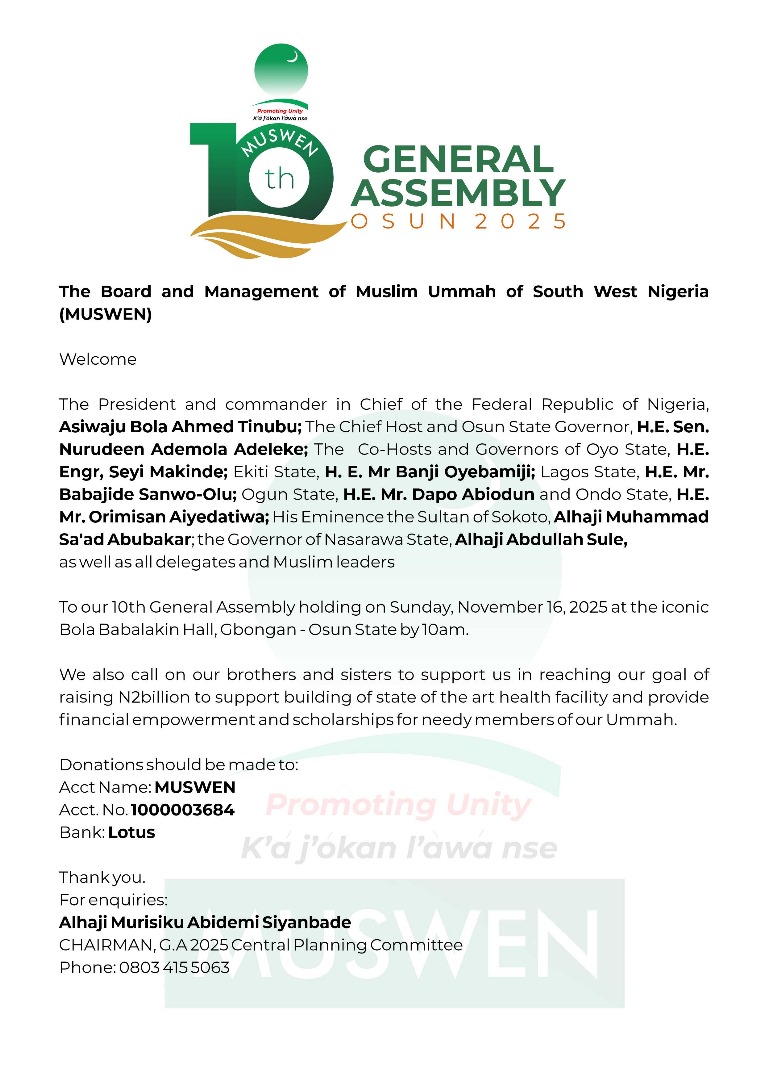Muslims around the world bade farewell to Ramadan 1446AH and celebrated the holidays of Eid el-Fitr on Sunday, March 30, 2025. This blessed month will never return, and for some, it was their last opportunity to fast in their lifetime.
As an entity, Ramadan is a mission accomplished as it has re-enlivened all souls that attended its training workshop. It has returned us all to the spiritual essence of life. We have to a large extent experienced living as Allah’s true servants.
The story of the modern man and the crises he is going through requires that we start from the conclusion. This is because he has failed to learn from arrival and departure of Ramadan. Our post Ramadan is more important because we have eleven months to translate the lessons so learnt; it is important as it unravels the success and quality of our fast to be able to be sincere in all endeavours, be disciplined at all times, be contented with little, be considerate for others and have good feeling for them, be conscious of our short stay in this world, be appreciative of the uniqueness and values of Islaam, be conscious of our health, be companions of the Qur’an through reading, recitation, memorization and elucidation, be patient on hunger and feel for the poor, etc.
But what do we see today? Muslims who turn Ramadan to a month of eating and drinking, of serious time wasting in the name of doing iftar and observing laylatul-qadr, of sleeping and backbiting, of boasting and show off via programmes on television and other avenues, etc. If the month of Ramadan is spiritually secure and yet people involve in anti-Ramadan activities, what will be their fate after it?
Unfortunately, as soon as Ramadan is over, its graduate who is supposed to keep protectively the spirit and benefits of the fast will just slip back into old indulgence. A Muslim who was disciplined and obedient to even forego his lawful food, drink and wife during the days of Ramadan will become uncontrollable in consuming forbidden food and drink, as if Allah (SWT) only exists therein and not in other months. One who has been so attached to the Qur’ān will gradually abandon it for worldly pursuits. In short, to him, Ramadan is over. Tahajjud is over. He has no time for the Salawāt at their due times. Memorizing the Qur’ān will be the last thing he will do. No more charity. No more tafseer, etc. Just before long, all evils and excesses, which the fast has come to purify him from, will engulf his life again. Then, there is need for another Ramadan to purify him. But that will be after a year and that is, if he is spared to witness it!
To mark the end of Ramadan and cleanse ourselves from human errors and other sins, we are expected to pay the Zakatul-fitr. It is also a form of welfare concern to make the poor and indigent Muslims happy on the day of eid. This charity is due on our staple food or its equivalent in cash. It is to be given out by the head of the family for all that are under his care (wives, children, parents, etc.). It is four mudus (one is estimated to be two palm-full of an adult person) per person. It is to be given in the last days of Ramadan up till the morning of eid before its observance. Whoever gives it after the eid prayer has only given out ordinary charity.
On eid day, we are expected to observe bath as we do for jum‘ah, cut our nails, remove the armpit and pubic hairs, wear fine dress, wear perfume (for men only), go out for the eid prayer, listen to the khutbah and be glorifying Allah (SWT) every now and then. We are expected to reflect over the reality of gathering of the last day as we see the mammoth crowd at the eid ground, we should also realize that we shall soon be no more as the Ramadan has come and gone.
Another post Ramadan task is the six-day fast in Shawwal. A Muslim should endeavour to observe it preferably immediately after eid or as convenient before the end of the month of Shawwal. One may decide to fast it at a stretch or spread it out. This fast added to that of Ramadan, according to our noble Prophet (SAW), is equal to having fasted the whole year.
Then as graduates of Ramadan College, the expectation is high. We were certificated as Rabaniyyin and not Ramadaniyyin. That is, people who have become Godly in every action and utterance and not just Ramadan delegates or attendees. You justify this by sustaining your Ramadan activities in terms of voluntary prayers and fasts, reading Qur’an, charity, etc.
Guest writer: Dr. Zafaran Adeniyi, CEO Vanguards Academy, Odosengolu, Ogun State.







